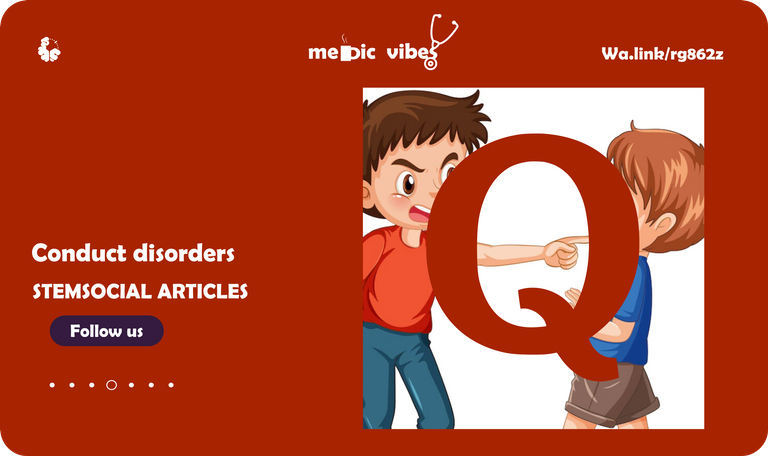What’s the difference between conduct disorder and schizophrenia aggression?
In the last post, we saw how:
- Pyromania is a disorder is characterized by an abnormal interest in fire.
- Conduct disorder are difficult disorder to treat and requires special care and attention.
- Pyromania is treated with pharmacotherapy and psychotherapy.
How do you help young people with conduct disorder?
Welcome to Medic Vibes, where we discuss mental health disorders and make sense of them. Dr Ebingo Kigigha is a medical doctor (aspiring psychiatrist) and creative person (illustration and music). This has been our routine for four consecutive months. This month will be dedicated to Conduct disorder. In the first month, we discussed Depression, and in the subsequent month, anxiety. We just finished with Eating disorders.
In this post, we are looking at Tik Tok. To learn more just keep scrolling down. You can also skip to the key point of the post if you which or go to the conclusion to get the summary.

Oppositional defiant disorder, is a behavioral disorder that is characterized by a pattern of disobedient, defiant, and hostile behavior towards authority figures. This disorder typically appears in children and adolescents, and can have a significant impact on the child's development, academic performance, and social interactions.
The cause of Oppositional defiant disorder is not well understood, but it is believed to be a result of a combination of genetic and environmental factors. Children with ODD may have a genetic predisposition to the disorder, which is then triggered by environmental factors such as family conflict, trauma, or abuse.
These can include a wide range of behaviors, such as arguing with adults, refusing to comply with requests or rules, deliberately annoying others, blaming others for their own mistakes, being touchy or easily annoyed, being spiteful or seeking revenge, and being angry and resentful.
This is made by a qualified mental health professional, who will consider the child's behavior and rule out other conditions, such as Attention Deficit Hyperactivity Disorder (ADHD), that might also cause similar symptoms.
Oppositional Defiant Disorder is a behavioral disorder that affects children and adolescents, characterized by disobedient, defiant, and hostile behavior towards authority figures. This behavior can cause significant problems in a child's relationships with parents, teachers, and peers and can result in academic difficulties, legal problems and poor quality of life.
The exact cause of Oppositional Defiant Disorder is not known, but it is believed to be a combination of genetic and environmental factors. Research suggests that children who are predisposed to Oppositional Defiant Disorder may develop the disorder when exposed to environmental factors such as poverty, parental stress, family conflict, and inconsistent or harsh discipline. Additionally, certain brain chemicals, such as dopamine, may also be involved in the development of the disorder.

Conduct disorders and Schizophrenia(Reaction)

Image by brgfx on Freepik
Susan Canaday explained that conduct disorder is a condition that affects how a person controls their emotions and actions, but it doesn't affect their perception of reality. It's not a psychotic disorder and it doesn't involve hearing voices. On the other hand, Schizophrenia is a type of mental illness that does affect a person's perception of reality.
One of the symptoms of Schizophrenia is hearing voices or having other hallucinations. A helpful resource for learning more about Schizophrenia is a book called "Coping with Schizophrenia" written by Kim Mueser and Sue Gingerich. It can be beneficial to read this book with loved ones who want to understand the condition.
Treatment for Schizophrenia can be effective with consistency and determination.
Conduct disorder and schizophrenia are two distinct mental health conditions, with different symptoms, causes, and treatments.
Conduct disorder is a mental health condition that typically appears in childhood or adolescence and is characterized by a persistent pattern of behaviors that violate the rights of others or societal norms. These behaviors can include aggression towards people or animals, destruction of property, deceitfulness, and theft. Children and teens with conduct disorder may also have difficulty following rules and may have poor impulse control. They may also have difficulty empathizing with others and understanding the impact of their actions.
Schizophrenia, on the other hand, is a severe and chronic mental health condition characterized by a range of symptoms affecting thoughts, emotions, and behavior. These symptoms can include hallucinations (hearing voices or seeing things that are not there), delusions (fixed false beliefs), disordered thinking, and a lack of emotional expression. People with schizophrenia may also experience difficulties with attention and memory, and may have trouble with daily living skills such as self-care, and working or studying.
While conduct disorder is primarily a disorder of behavior, schizophrenia is a psychosis disorder, characterized by disruptions to a person's perceptions and thoughts, and often manifesting as auditory hallucinations and delusions.

Treating Pyromania
To effectively treat Oppositional Defiant Disorder, several types of therapy are available and a combination of them are usually recommended, including behavioral therapy, parenting skills training, and in some cases medication. Behavioral therapy is one of the most effective forms of treatment for Oppositional Defiant Disorder, specifically, parent-child interaction therapy and cognitive behavioral therapy. Parent-child interaction therapy teaches parents how to improve their child's behavior by giving effective commands, using positive reinforcement, and how to respond to misbehavior. While cognitive behavioral therapy focuses on the child and teaching them to identify and change negative thoughts and beliefs that contribute to their behavior, coping with triggers that lead to problem behaviors.
Parenting skills training is another important part of treatment for Oppositional Defiant Disorder as it helps parents create a structured and positive home environment for the child. This type of training teaches parents how to set clear and consistent rules, how to use positive reinforcement, and how to provide appropriate consequences for misbehavior. It also helps parents communicate effectively with their child and be more responsive to their child's needs.
Medication may be prescribed in some cases to alleviate symptoms of irritability, impulsivity, and aggression that are commonly associated with Oppositional Defiant Disorder. Antidepressant and anti-anxiety medications are known to be effective in treating these symptoms. It is important to note that treatment plan will vary depending on the child's individual needs
Questions
- What did you learn about Conduct disorders?
Conclusion
- Oppositional defiant disorder, is a behavioral disorder that is characterized by a pattern of disobedient, defiant, and hostile behavior towards authority figures.
- Conduct and Schizohrenia are two different mental health conditions, psychosis can make a person present with some antisocial features but these are two different conditions.
- The treatment for oppositional defiant disorder is a combination of psychotherapy and pharmacotherapy.

References
Page demarcations made with Inkscape.org


Thanks for your contribution to the STEMsocial community. Feel free to join us on discord to get to know the rest of us!
Please consider delegating to the @stemsocial account (85% of the curation rewards are returned).
You may also include @stemsocial as a beneficiary of the rewards of this post to get a stronger support.
Congratulations your publication has been chosen among the best of the day.
KEEP CREATING GOOD CONTENT.